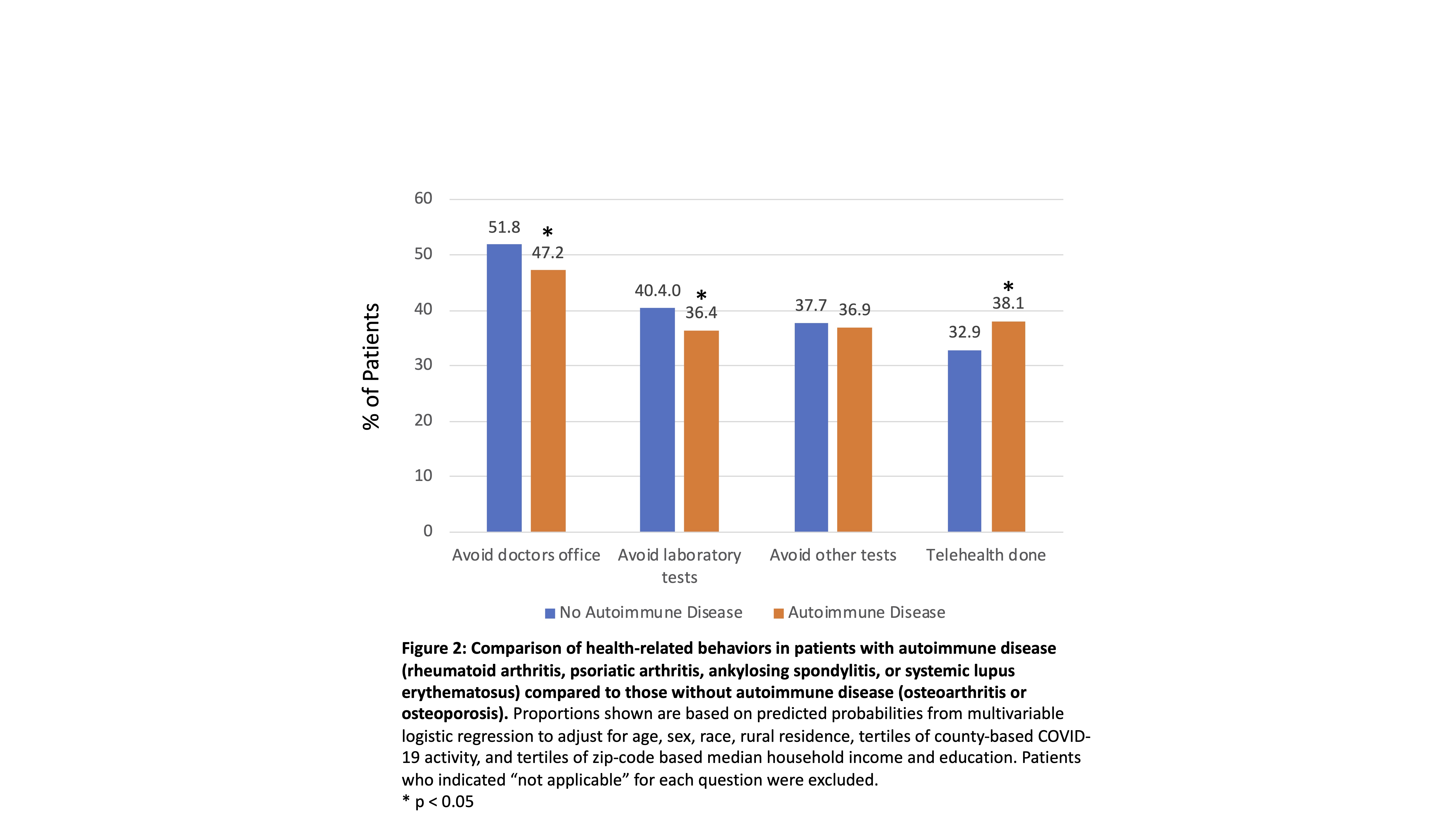Session Information
Date: Friday, November 6, 2020
Title: Patient Outcomes, Preferences, & Attitudes I: COVID-19 (0464–0468)
Session Type: Abstract Session
Session Time: 5:00PM-5:50PM
Background/Purpose: Patients with autoimmune rheumatic diseases (ARD) may be particularly concerned about COVID-19. We aimed to compare concerns and health-related behaviors of patients with common autoimmune rheumatic conditions versus patients with non-autoimmune rheumatic conditions during the COVID-19 pandemic.
Methods: Adults cared for by members of a multi-state rheumatology provider network (AARA) were invited to complete an online survey (completed April 22 to May 27, 2020). Demographics and rheumatic diagnoses were obtained from the electronic health record data warehouse (Columbus) and linked to the survey. Analyses were restricted to patients with primary diagnoses of common ARD (rheumatoid arthritis, psoriatic arthritis, ankylosing spondylitis, or systemic lupus erythematosus) or patients with non-autoimmune rheumatic disease (osteoarthritis or osteoporosis) who had no ARD diagnoses or DMARD use. Concerns about COVID-19 and health-related behaviors were compared in patients with autoimmune versus non-autoimmune disease using logistic regression, adjusting for demographics, rural residence, and zip-code based measures of COVID-19 activity, income, and education.
Results: Among 18219 respondents with completed surveys, 9004 met criteria for a primary diagnosis of interest, 7176 with and 1828 without autoimmune disease. Patients with ARD were younger (mean age 58 vs. 69) and less commonly female (78% vs. 85%) (Table 1). Respiratory illnesses were reported by 353 (3.9%) and COVID-19 diagnoses by 66 (0.7%). After multivariable adjustment, patients with and without autoimmune disease expressed similar concerns about COVID-19 and similar social distancing behaviors (Figure 1). Older age, female sex, Black race, urban residence, and higher county COVID-19 cases per capita were associated with higher levels of concern (all p< 0.001). Patients with ARD had greater concerns related to their rheumatic condition (Figure 1, p < 0.001). Among patients with ARD, those with lupus and those treated with biologics/janus kinase inhibitors (JAKi) or glucocorticoids had greater COVID-19-related concerns (all p < 0.01). Among the 5543 patients receiving a DMARD, 571 (10.3%) stopped a medication because of concerns about COVID-19. Patients with ARD were less likely to avoid a doctor’s visit or laboratory tests and were more likely to have had a telehealth visit (38% versus 33%, Figure 2, all p < 0.01) compared to those with non-autoimmune disease.
Conclusion: Concerns about COVID-19 and degree of social distancing were similar in patients with ARD vs. those with non-autoimmune rheumatic disease. Those with ARD had more concerns specific to their rheumatic condition, especially patients with lupus and those treated with biologics/JAKi or glucocorticoids. Patients with ARD were less likely to avoid office visits and testing and more likely to have telehealth visits, perhaps reflecting the need for closer monitoring of these conditions. These results emphasize the impact of the pandemic across patients with rheumatic disease and the need to ensure adequate follow-up and address concerns specific to patients with autoimmune disease as the pandemic continues.
To cite this abstract in AMA style:
George M, Venkatachalam S, Banerjee S, Baker J, Merkel P, Curtis D, Gavigan K, Danila M, Kirby D, Munoz G, Sunshine W, Nowell W, Curtis J. Concerns and Health-Related Behaviors During the COVID-19 Pandemic in Patients with or Without Autoimmune Rheumatic Disease in a Large Physician Network [abstract]. Arthritis Rheumatol. 2020; 72 (suppl 10). https://acrabstracts.org/abstract/concerns-and-health-related-behaviors-during-the-covid-19-pandemic-in-patients-with-or-without-autoimmune-rheumatic-disease-in-a-large-physician-network/. Accessed .« Back to ACR Convergence 2020
ACR Meeting Abstracts - https://acrabstracts.org/abstract/concerns-and-health-related-behaviors-during-the-covid-19-pandemic-in-patients-with-or-without-autoimmune-rheumatic-disease-in-a-large-physician-network/



